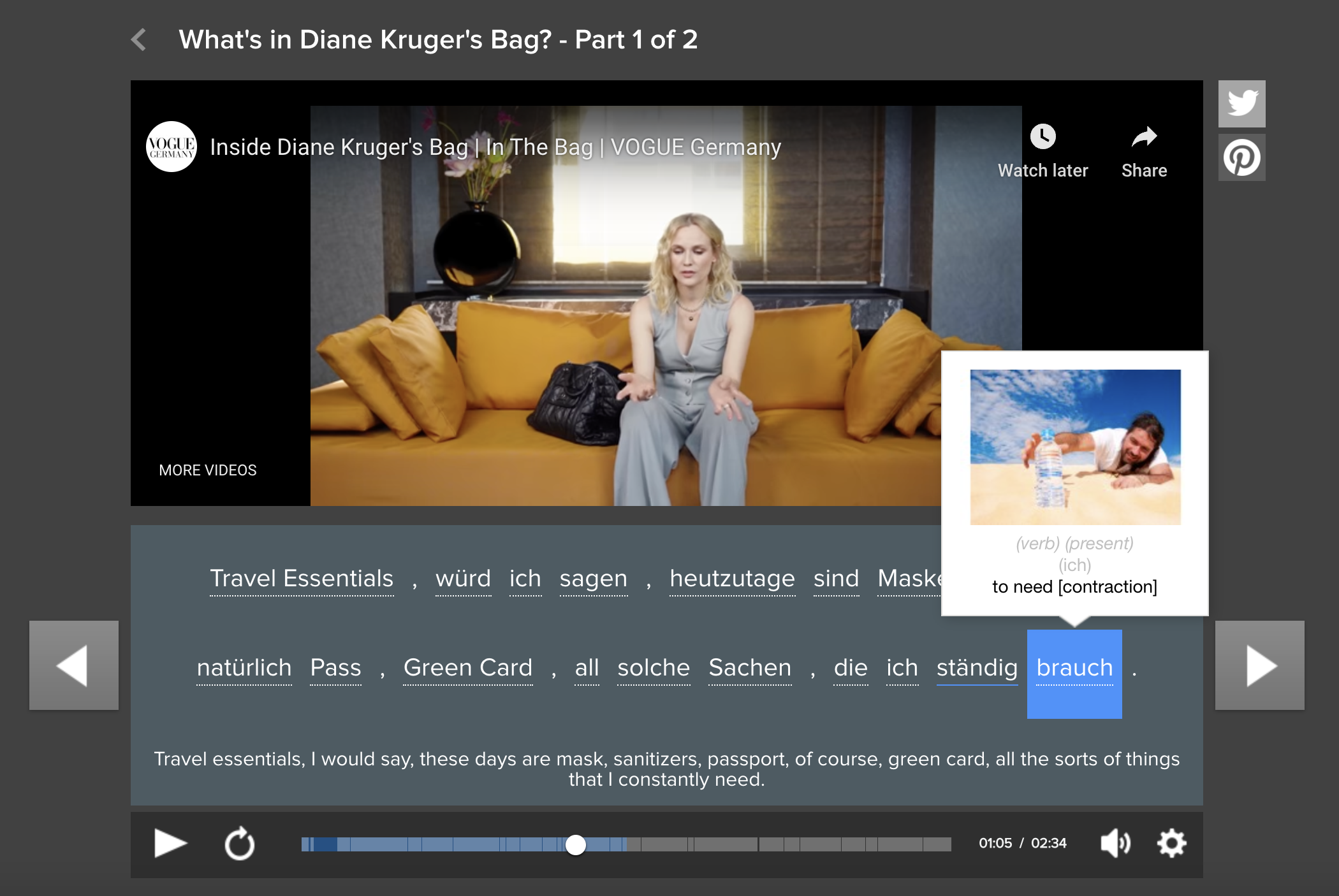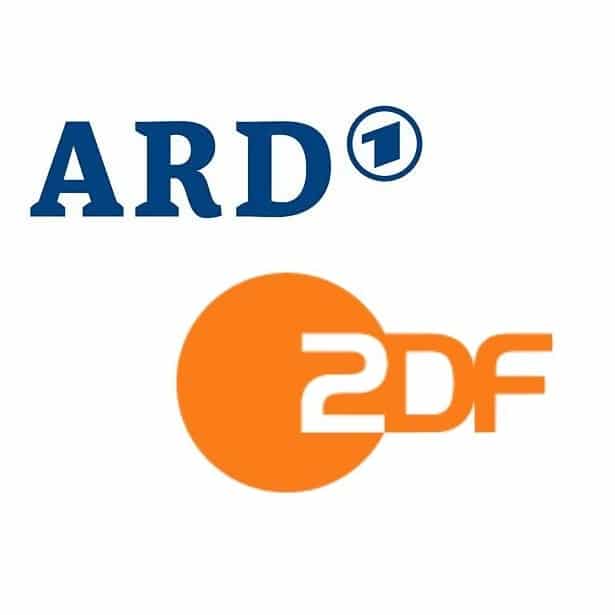
German Listening Practice: 15 Essential Audio and Video Resources [2024]
There’s little point in German listening practice if it doesn’t prepare you for real life.
One of the essential skills in language learning is training your ears to hear common German vocabulary and phrases that native speakers actually use.
To practice listening, we’ve got 15 German listening practice resources that will acclimate you to authentic German speech at any level. You’ll also find lots of extra learning tools, like transcripts and vocabulary support.
Contents
- 15 Audio and Video Tools to Hone Your Ears with Authentic German
- 1. Radio D
- 2. FluentU
- 3. Langsam gesprochene Nachrichten (Slowly Spoken News)
- 4. GermanPod101
- 5. Spotify’s Germany Top 50 Chart
- 6. German Public TV: ARD and ZDF
- 7. “Tagesschau”
- 8. Easy German
- 9. MOSALingua
- 10. Freiszene.de
- 11. Deutschlernerblog
- 12. Council of Europe German Listening Comprehension
- 13. Deutsch.ie German Listening Practice
- 14. Your Daily German
- 15. SchulArena
- Why Prioritize German Listening Practice?
- How to Practice German Listening
Download: This blog post is available as a convenient and portable PDF that you can take anywhere. Click here to get a copy. (Download)
15 Audio and Video Tools to Hone Your Ears with Authentic German
So here is a list of some of the web’s best resources for real German listening practice. From curious beginners to advanced news junkies, this collection offers something for everyone to improve their German listening comprehension.
1. Radio D
This project is a joint effort of Deutsche Welle, a popular German news broadcaster, and the Goethe-Institut, the academic authority on all things related to the German language.
These simple radio dramas are perfect for German listening practice for beginners. Transcripts and English summaries are available, so you’ll never be lost for a second.
The 15-minute-long podcast episodes are organized into fun themes, such as “Mauerbau” (“Wall Building”), “Ost und West” (“East and West”) and “Berlin Mitte” (“Berlin City Center”). The themes are chosen specifically to give listeners current cultural knowledge about German, while learning the language at the same time.
2. FluentU
FluentU is an excellent resource for listening practice with a video component. It teaches you German words, phrases and expressions through short clips from authentic German media including movie trailers, scenes from TV shows and news segments.
Each video comes with a transcript and interactive subtitles available in both German and English. You can hover over any word in the subtitles to see its translation, part of speech and a corresponding image.

By clicking on a word, you’ll also get example sentences, audio pronunciation (at normal and slow speeds) and other videos where it’s used.
After watching a video, you’ll take a personalized vocabulary quiz to test your knowledge of the key vocabulary. You can also add new words to a flashcard deck so you can review them and commit them to memory.
3. Langsam gesprochene Nachrichten (Slowly Spoken News)
Another Deutsche Welle production, these recordings are more suited for upper-intermediate learners. These are real Deutsche Welle news reports, spoken slowly and clearly so that learners won’t miss a word.
The website boasts a large glossary of vocabulary from the news, as well as a complete collection of written transcripts. With updates every weekday, you’ll never run out of recordings to practice with—and you’ll stay informed about current events from Germany and around the world.
This podcast also fills listeners in on what’s going on in Germany today, so you stay updated with national and local politics, arts and culture, plus other issues affecting German society, from inflation to immigration.
4. GermanPod101
GermanPod101 was created specifically to give you relevant, entertaining German listening practice. It’s a series of video and audio podcasts with hundreds of German listening and language lessons—plus new ones added every week.
The hosts are language experts who teach you to understand (and use) the expressions you’d need in real German life. Plus, you’ll get familiar with German media and pop culture (which isn’t just great for listening practice—it also gives you plenty to talk about with native speakers!).
You don’t need to just rely on your ears. GermanPod101 comes with tons of supplemental learning tools, such as transcripts, interactive quizzes and an audio dictionary to instantly define the words you hear.
Since it’s produced by Germans in Germany, you’re sure to get up to date valuable cultural information about the German speaking world as you grow your vocabulary and bank of useful phrases.
5. Spotify’s Germany Top 50 Chart
If you’re a Spotify user, you can listen to Germany’s top hits no matter where you live. Germans love English music, so most of the tracks on the German charts will be songs you already recognize. But never fear: there are always new German hits making their way onto the list too.
Be on the lookout for performers like CRO, Seeed, Alligatoah and Sido. Whether you like rap, rock, pop or anything in between, the German music scene has something to offer.
It’s fun to listen to songs both actively (by trying to translate the lyrics) or passively as background music for other activities such as driving, doing chores, or surfing the web. If you listen to a song several times even passively, you’ll start to memorize the lyrics over time.
6. German Public TV: ARD and ZDF
If you’re ready for German listening practice with the most authentic content possible, German public broadcasters such as ARD and ZDF upload many of their shows for free, often with subtitles available, usually with no viewer location restrictions.
Thanks to the controversial Rundfunkgebühren, the broadcasting fees that virtually all German residents must pay, anyone can stream German media on demand—from crime dramas to talk shows to live soccer.
Since we’re talking about audio resources, it should be noted that these streams include radio shows too, but let’s face it: TV is an even more engaging way to sharpen your listening skills.
Be sure to check out the show the long running beloved series “Tatort” (“Crime Scene”) if you’re into those types of shows.
7. “Tagesschau”
There’s a whole host of German news sources to help you to improve all aspects of your German; however, “Tagesschau” (A Look at the Day) is the most famous and most-watched German news show out there!
There’s plenty of resources on the “Tagesschau” website to help you to perfect your German listening skills. A good place to start is “Tagesschau 20 Uhr” (the evening version of “Tagesschau”), which lasts around 15 minutes and covers all of the topics you would expect to come up in an evening news program, such as current events and the weather.
If 15 minutes is a little too long to hold your focus, try just watching segments of the show that you’re interested in, such as sports. Alternatively, head to the “Tagesschau 100 Sekunden” (“A Look at the Day in 100 Seconds”) section, where 100-second-long videos are posted, summarizing the day’s news.
8. Easy German
Easy German is one of the best German YouTube channels for beginners and pros alike. Whether you’re looking to improve your grammar, learn about topics such as food, or gain a better understanding of culture and politics in Germany, there really is something for everyone.
If you’re just starting out, watch this video about the weather, for example, which is perfect for beginners. Not only does it discuss a relatively simple topic, but the subtitles enable you to see how some of the trickier words are spelled, making it easier to learn, remember and re-use them.
Some of the more challenging videos don’t have subtitles in any language. While these videos are still slow and easy to follow, they’re ideal for more advanced students who want to take their listening skills to the next level.
9. MOSALingua
MOSALingua is the perfect app for improving your German listening and it comes with a great bonus—it’s free!
MOSALingua uses an effective language learning system based on several cognitive concepts. Active recall, for example, is a very important part of this app. This is the ability to extract a foreign language word from your own memory, without hints or suggestions—a vital skill for all language learners!
This app includes over 37 different German dialogues. Each is clearly spoken by native German speakers, so they will accurately teach you how to pronounce even the trickiest of words. These dialogues cover topics from food to travel, so you’re bound to find something you’re interested in.
The app also offers plenty of tools to assist you with your language skills. Flashcards, for example, can help you to easily follow audio and remember some of the trickier vocab.
10. Freiszene.de
Freiszene.de has hundreds of audiobooks to choose from, covering a huge variety of genres. What’s more, there’s a wonderful bonus: they’re all free! Simply search for a term, title or author you’re interested in, or browse by popularity or upload date.
If you want to start by listening to a story you’re familiar with, try out “Alice in Wonderland.” While some of the vocab might be a little challenging, the fact that you know the plot will help you to work out the meanings of certain words from their context.
If you’re looking for something a little more typisch Deutsch (typically German), try out “Die verzauberte Insel” (“The Enchanted Island”) by Sigrid Heuck—the story of Mira: A young girl who wants to find out if her island is really enchanted, like her grandpa always says.
11. Deutschlernerblog
Deutschlernerblog is a website that has multiple resources and lessons for learners of all levels. In terms of listening comprehension, it offers five categories for different levels from beginner to advanced.
To use Deutschlernerblog to boost your listening comprehension, simply scroll down to the Hörverstehen list and choose your level (A1 is easiest, C1 is hardest). Once you’re there, exercises cover everything from basic vocabulary and simple verb conjugations to dialogues and short clips of native German audio.
Following the audio clip, each entry has comprehension questions. These range from true-and-false questions to specific questions about the topic of the audio recording if it’s grammar-based. The questions are in German too, so you’ll get a well-rounded language workout.
12. Council of Europe German Listening Comprehension
On this website, you’ll find a selection of listening practice tests from various official German proficiency exams. This is especially useful if you’re planning to take one of those exams, such as the TestDaF.
The Council of Europe has a sampling of practice tests (from the TestDaF as well as the American Council on the Teaching of Foreign Languages, National Foreign Language Exam System and ÖSD).
Each German listening test includes an audio recording as well as a PDF of the transcript and comprehension questions.
These questions range from true-or-false and fill-in-the-blank questions to short- and long-answer questions. The recordings vary in length from a couple minutes to around 15 minutes.
13. Deutsch.ie German Listening Practice
Like the Council of Europe, the Deutsch.ie website includes past materials from the German aural exam portion of the Leaving Certificate exam—the final exam in the Irish school system (also known as “Leaving Cert”).
Currently, there are nine past exams available, and their German listening comprehension components are quite extensive.
Each past Leaving Cert German aural exam includes around 14 minutes of audio. It’s comprised of four parts: an interview, phone call, a dialogue and a news segment, each with its own comprehension questions.
These questions are displayed on the website for each entry with the answers hidden. I suggest writing the answers to the questions down and then looking at the correct answers once the whole exam is completed.
This resource is best for learners who are at least at the intermediate level.
14. Your Daily German
Unlike other resources on this list, Your Daily German offers short folk tales told in German. There are seven such folk tales available currently, and they’re based on real German stories that’ve been around for centuries.
The best part of Your Daily German is that you can listen to the stories at a regular speed or a slower speed. I would suggest starting at the regular speed and then using the slower speed for stories that are particularly complex or difficult to understand.
The audio stories on Your Daily German include transcripts. This site is recommended for learners who are at least at the upper-beginner level, since the stories are told completely in German. The website allows you to access two stories a week for free, but charges a fee to keep using the website after that.
15. SchulArena
This website is entirely in German, so it’s recommended for at least upper-beginner learners.
There are four levels of listening comprehension: einfach (easy), mittel (intermediate), schwierig (hard) and schriftlich (writing response). Exercises in the first three levels (einfach, mittel and schwierig) include a video as well as built-in comprehension questions. Some videos, especially for the mittel and schwierig level, are actually full documentaries up to one hour long. So this is a perfect resource if you’re looking for longer German listening practice audio materials.
There’s one more section of listening activities called spezial(special), which focuses on listening comprehensions related to travel within Switzerland.
It’s also important to note that SchulArena is based in Switzerland and some audio recordings are done in the Swiss dialect and accent. Make sure to brush up on your Swiss German for those tests.
Why Prioritize German Listening Practice?
Expressing yourself is only half the battle. It’s great if you’ve armed yourself with some German survival phrases for travel, such as “Wo ist die Toilette?” (“Where is the toilet?”) but if you can’t understand the answer—especially if it’s in a dialect like Bavarian or Saxonian—you’re going to have a problem on your hands.
This will become very important if you plan to take a tour through the various regions of Germany.
Language doesn’t just live in books or newspapers, either. Sometimes the things you read in simple, proper Hochdeutsch (High Standard German) don’t correspond to the things you’ll hear in the street. There’s a whole world of idioms and slang out there, just waiting to throw you a curve ball.
How to Practice German Listening
The most important thing is simply to expose yourself to the language. Listen to whatever you can, even if you don’t understand every word, so that you can get used to hearing the language and its rhythms.
This can be achieved by constantly exposing yourself to the language through some great German movies, TV shows or music videos.
Once you decide to really get engaged in German listening practice, you’ll quickly find that you have a variety of options. The right strategy for you will depend on your current level, overall goals, learning pace and preferred resources.
Many of the resources in the above list provide you with transcripts and translations from the start. If they’re there, use ’em! This will help you connect the things you hear to the things you see, allowing you to train reading and listening at the same time. While this method requires your full attention, it’s okay to take breaks and to study a little bit at a time, as long as you are consistent.
You can further boost your comprehension with outside resources like dict.cc and Linguee to help you. Even Google Translate, despite being notorious for its numerous errors, can still help you get the gist of things.
Some of these recordings are as authentic as it gets because they’re made by native speakers, for native speakers. These don’t always come with translations and exercises to help you, but you can help yourself. You might be able to find song lyrics, for example, by Googling a song title plus the word “Songtext” (lyrics). You may even be able to find English translations of the Songtext in the same way—LyricsTranslate is a good resource for this.
Overall, just keep your ears open. Don’t waste time jotting down and looking up every word you don’t know, as long as you understand the general idea of what’s happening. Writing down just a few key words or phrases is a good strategy if you’re determined to review them again at a later time.
Alle Einsteigen (all aboard) the listening comprehension train! These German listening practice resources will help you travel seamlessly through the German language.
Download: This blog post is available as a convenient and portable PDF that you can take anywhere. Click here to get a copy. (Download)

















